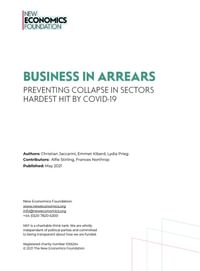Business in arrears
Preventing collapse in sectors hardest hit by Covid-19
30 June 2021
Despite the early success of the vaccine rollout, the Covid-19 public health crisis is far from over; the economic fallout may continue long after restrictions have been lifted. The government has already taken action to help mitigate the impact. For example, the furlough scheme, grants, loans, and an eviction ban have prevented many businesses from going under. Survey data, however, suggests that around one in thirteen businesses have little or no confidence that they’ll make it through the next three months, and over one in six businesses either anticipate having to make redundancies or are not sure if they’ll have to. SME bank lending was 80% higher in 2020 than 2019, and it is estimated that approximately a third of firms with Covid Business Interruption Loan Scheme and Bounce Back Loan Scheme loans may struggle to make repayments.
This report reviews the differing experiences of UK economic sectors during the crisis so far, the support offered by the government, and why the financial viability of many businesses still looks precarious. We then outline and justify six criteria for assessing a successful government response to the commercial rent arrears problem. Three of these criteria are outcome principles, which describe the ends that an effective policy response ought to achieve. The remaining three are design principles that a policy ought to achieve in order to be feasible. An effective policy should protect productive capacity, minimise regressive wealth transfers (and prioritise UK citizens) and minimise the future debt-burden for SMEs. Its design ought to prioritise help to those in need ahead of ensuring that only the most deserving receive support, maximise legal enforceability, and minimise administrative work.
We use a multi-criteria analysis to compare current UK government policy and five alternative policies: partial rent cancellation, subsidised rent reduction, public sector pays, rent deferral, and Bank of England investment in land. The first four policies were inspired by international examples.
According to this analysis, all five alternative policies outperform the UK government’s current stance, with partial rent cancellation emerging as the most favourable policy, and the rent deferral and public sector pays options coming in joint second.
This report recommends that the government put in place a policy of partial rent cancellation, with up to 100% of rent being cancelled for those businesses forced to close and a significant proportion of rent cancelled for those businesses that can remain open but are in sectors with significantly reduced turnover. These reductions should also apply to rent arrears accumulated during such times. Turnover would be assessed at the industry level; there would be no firm-level assessment. This sectoral approach strikes a balance between quickly getting support to businesses in trouble, while not expecting landlords renting to tenants in relatively unaffected sectors to forego their rents. Concentrating support on SMEs would help target the most vulnerable businesses. Most employment is also provided by SMEs. The policy would apply to unpaid historical rent and future rents, during periods of national and local restrictions, and compensation could be paid to landlords pushed into dire financial straits.
Image: Unsplash
Topics Local economies Housing & land







